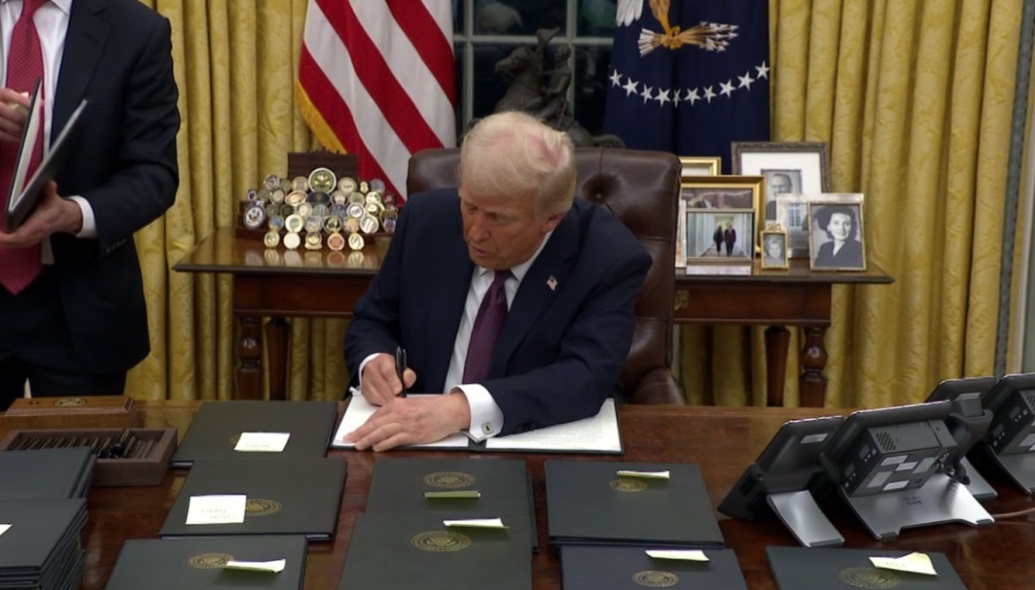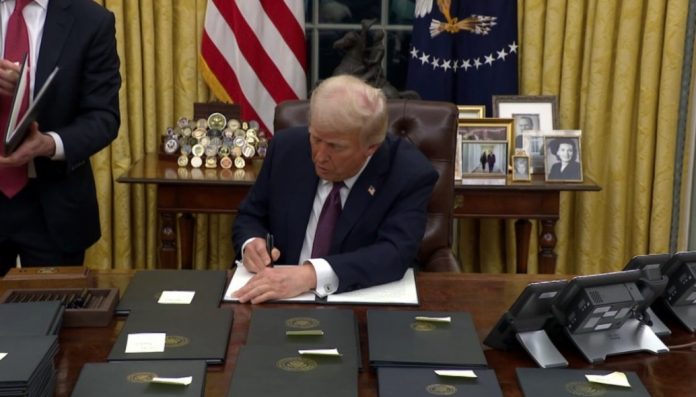ซีแอตเทิล (CNN) — ผู้พิพากษาของรัฐบาลกลางกล่าวเมื่อวันพฤหัสบดีว่า คำสั่งบริหารของประธานาธิบดีโดนัลด์ ทรัมป์ ที่ยกเลิกสิทธิการเป็นพลเมืองโดยกำเนิดนั้น “ขัดต่อรัฐธรรมนูญอย่างชัดเจน” และได้ออกคำสั่งระงับชั่วคราวเพื่อหยุดการบังคับใช้นโยบายดังกล่าว
ผู้พิพากษาจอห์น คัฟเฟนเนาเออร์ ผู้ซึ่งได้รับการแต่งตั้งโดยโรนัลด์ เรแกน และปฏิบัติหน้าที่ในเมืองซีแอตเทิล ได้อนุมัติคำร้องจากนิค บราวน์ อัยการสูงสุดของรัฐวอชิงตัน และอีกสามรัฐที่มีผู้นำเป็นพรรคเดโมแครต ให้หยุดการบังคับใช้นโยบายดังกล่าวเป็นเวลา 14 วัน เพื่อให้มีเวลาเพิ่มเติมสำหรับการยื่นคำร้องในกระบวนการทางกฎหมาย
“ผมทำงานบนบัลลังก์ศาลมากว่า 40 ปี แต่ผมจำไม่ได้ว่ามีคดีไหนที่คำถามที่ยกมานั้นชัดเจนเท่านี้” คัฟเฟนเนาเออร์กล่าว
“พวกทนายความอยู่ที่ไหนตอนที่ตัดสินใจเซ็นคำสั่งบริหารนี้” ผู้พิพากษาถาม และเสริมว่ามัน “ทำให้ผมงุนงง” ที่มีนักกฎหมายคนใดอ้างว่าคำสั่งนี้ชอบด้วยรัฐธรรมนูญ
รัฐที่นำโดยพรรคเดโมแครตเหล่านี้กำลังขอคำสั่งระงับชั่วคราว โดยอ้างว่าคำสั่งบริหารของทรัมป์เป็นการละเมิดมาตราแก้ไขรัฐธรรมนูญฉบับที่ 14 (14th Amendment) อย่างร้ายแรง ซึ่งรับรองความเป็นพลเมืองแก่เด็กทุกคนที่เกิดในดินแดนของสหรัฐอเมริกา “และอยู่ภายใต้เขตอำนาจของประเทศนี้”
เลน โพลอซโซลา ทนายความของรัฐวอชิงตัน กล่าวต่อศาลว่า “การเกิดของเด็กไม่สามารถหยุดรอได้” ในระหว่างที่ศาลพิจารณาคดีนี้
“มีเด็กที่กำลังเกิดในวันนี้ ทั้งในรัฐของโจทก์และทั่วประเทศ ซึ่งมีความไม่แน่นอนปกคลุมสถานะความเป็นพลเมืองของพวกเขา” โพลอซโซลากล่าว พร้อมเสริมว่าเด็กที่ถูกปฏิเสธความเป็นพลเมืองภายใต้คำสั่งของทรัมป์จะต้องเผชิญกับ “ผลกระทบทางลบที่รุนแรงในระยะยาว”
โพลอซโซลาแย้งเพิ่มเติมว่ารัฐบาลทรัมป์ไม่เพียงแต่ละเลยผลกระทบเหล่านั้นในเอกสารที่ยื่นต่อศาลจนถึงตอนนี้ แต่ดูเหมือนว่าผลกระทบเหล่านี้จะเป็น “เป้าหมายหลัก” ของคำสั่งบริหารนี้
นอกเหนือจากผลกระทบที่คำสั่งของทรัมป์จะมีต่อผู้อยู่อาศัยในรัฐของพวกเขา วอชิงตันและรัฐอื่น ๆ ยังโต้แย้งว่าสิ้นสุดสิทธิการเป็นพลเมืองโดยกำเนิดจะสร้างภาระต่อโครงการของรัฐทั้งทางการเงินและด้านการบริหาร เนื่องจากเด็กที่ถูกตัดสิทธิ์จากการเป็นพลเมืองจะไม่ได้รับสวัสดิการจากรัฐบาลกลางที่พวกเขามีสิทธิ์ตามสถานะพลเมือง
รัฐบาลทรัมป์แย้งว่าข้อความในรัฐธรรมนูญที่ระบุว่า “อยู่ภายใต้เขตอำนาจของประเทศนี้” (subject to the jurisdiction thereof) อนุญาตให้ประธานาธิบดีตัดสิทธิ์เด็กที่เกิดจากผู้เข้าเมืองที่ไม่มีเอกสาร และแม้กระทั่งเด็กที่เกิดจากพ่อแม่ที่อยู่ในสหรัฐอเมริกาโดยชอบธรรมแต่ยังไม่ได้สถานะถาวร
เบรตต์ ชูเมต ทนายความจากกระทรวงยุติธรรม เรียกร้องให้ผู้พิพากษาเลื่อนการออกคำสั่งฉุกเฉินเพื่อหยุดนโยบายดังกล่าวจนกว่าจะมีการพิจารณาเพิ่มเติม
“ผมเข้าใจข้อกังวลของคุณ” ชูเมตกล่าว แต่เขาขอให้ศาลไม่ตัดสินใจ “อย่างเร่งรีบ” เกี่ยวกับประเด็นสำคัญนี้
ชูเมตยังระบุว่าคดีอื่น ๆ ที่ท้าทายคำสั่งบริหารนี้กำลังดำเนินไปอย่างช้ากว่า และอ้างว่ามี “อันตรายเร่งด่วน” ที่คุกคามรัฐเหล่านี้
ที่ทำเนียบขาวเมื่อวันพฤหัสบดี ทรัมป์บอกกับผู้สื่อข่าวว่ารัฐบาลจะต่อสู้กับคำตัดสินดังกล่าว
คดีอื่น ๆ ที่กำลังดำเนินการทั่วประเทศ
มีคดีฟ้องร้องเพิ่มเติมเพียงไม่กี่คดีที่ถูกยื่นในสัปดาห์นี้เพื่อต่อต้านคำสั่งดังกล่าว รวมถึงคดีที่ยื่นโดยกลุ่มอัยการสูงสุดจากพรรคเดโมแครต กลุ่มสิทธิผู้อพยพ และโจทก์ส่วนบุคคล
ในการประชุมสถานะคดีเมื่อวันพฤหัสบดีที่ผ่านมาซึ่งเกี่ยวข้องกับหนึ่งในคดีเหล่านี้ ทนายความของกระทรวงยุติธรรมได้บอกกับผู้พิพากษาของรัฐบาลกลางในรัฐแมริแลนด์ว่า เขาไม่ทราบถึงหน่วยงานรัฐบาลกลางใดที่ได้ดำเนินการเตรียมการเพื่อบังคับใช้คำสั่งนี้ในเดือนหน้า ความท้าทายในคดีนี้ถูกยื่นโดยกลุ่มสิทธิผู้อพยพและหญิงตั้งครรภ์ในรัฐที่ลูกของพวกเธออาจได้รับผลกระทบจากคำสั่งดังกล่าว
“คำสั่งบริหารเพิ่งถูกออกมาเมื่อสามวันที่ผ่านมาในช่วงเปลี่ยนผ่านของรัฐบาล ดังนั้นจึงยังเร็วเกินไปที่หน่วยงานต่าง ๆ จะพัฒนานโยบายที่จำเป็นต่อการบังคับใช้” แบรด โรเซนเบิร์ก ทนายความกล่าวต่อผู้พิพากษาเดโบราห์ บอร์ดแมน แห่งศาลแขวงสหรัฐ
ผู้พิพากษามีกำหนดจะพิจารณาคำร้องของโจทก์ที่ต้องการให้ระงับคำสั่งชั่วคราวในการพิจารณาคดีวันที่ 5 กุมภาพันธ์
ในขณะเดียวกัน ในคดีที่ยื่นโดยสหภาพเสรีภาพพลเมืองอเมริกัน (ACLU) และกลุ่มสิทธิพลเมืองและสิทธิผู้อพยพอื่น ๆ ในรัฐนิวแฮมป์เชียร์ ผู้พิพากษาของรัฐบาลกลางในคดีดังกล่าวได้กำหนดให้มีการพิจารณาคดีในวันที่ 10 กุมภาพันธ์ เพื่อพิจารณาคำร้องของกลุ่มเหล่านี้ที่ต้องการระงับการบังคับใช้คำสั่งชั่วคราว
Judge blocks Trump’s ‘blatantly unconstitutional’ executive order that aims to end birthright citizenship

Seattle
CNN
—
A federal judge said Thursday that President Donald Trump’s executive order ending birthright citizenship was “blatantly unconstitutional” and issued a temporary restraining order to block it.
Judge John Coughenour, a Ronald Reagan appointee who sits in Seattle, granted the request by Washington Attorney General Nick Brown and three other Democratic-led states for the emergency order halting implementation of the policy for the next 14 days while there are more briefings in the legal challenge.
“I have been on the bench for over four decades. I can’t remember another case whether the question presented was as clear,” Coughenour said.
“Where were the lawyers” when the decision to sign the executive order was made, the judge asked. He said that it “boggled” his mind that a member of the bar would claim the order was constitutional.
The Democratic-led states are seeking a temporary restraining order, as they argue that Trump’s executive order is a blatant violation of the Constitution’s 14th Amendment, which guarantees citizenship to all children born on US soil “and subject to the jurisdiction thereof.”
An attorney for the state of Washington, Lane Polozola told the judge that “births cannot be paused” while the court considers the case.
“Babies are being born today here, and in the plaintiff states and around the country, with a cloud cast over their citizenship,” Polozola said.
Children denied citizenship under Trump’s order will face “longterm substantial negative impacts,” he added.
Polozola also argued that the Trump administration not only ignored those harms in the filings it has submitted so far in the dispute, but that harm “appears to be the purpose” of the executive order.
Beyond the impact that Trump’s order will have on their residents, Washington and the other states are arguing that the end of birthright citizenship will burden their state programs financially and logistically, as those children are shut off from federal benefits that they would be entitled to as citizens.
The Trump administration is arguing that that clause “subject to the jurisdiction thereof” allows the president to exclude the children of undocumented immigrants and even children whose parents are lawfully present but lack permanent legal status.
Justice Department attorney Brett Shumate urged the judge to hold off on issuing an emergency order blocking the policy until there was more briefing on the policy.
“i understand your concerns,” Shumate said, but he urged the court against making “a snap judgment on the merits.”
Shumate noted that the other cases challenging the executive order were moving on a slower timeline and argued that “imminent harm” is threatening the states.
At the White House on Thursday, Trump told reporters the administration will contest the ruling.
Other active cases across the country
A handful of other lawsuits have been brought this week against the order, including by a separate group of Democratic attorneys general, immigrant rights groups and individual plaintiffs.
During a status conference held Thursday in one of those cases, a lawyer for the Justice Department told a federal judge in Maryland that he wasn’t aware of any federal agencies that have taken steps to begin enforcement of the order next month. That challenge was brought by immigrant rights groups and pregnant women in the state whose babies could be impacted by the order.
“The executive order was issued three days ago during a time of change of administration. And so it’s very early for the agencies to develop their policies that would be necessary” to implement it, the attorney, Brad Rosenberg, told US District Judge Deborah Boardman.
The judge is set to consider a request by the plaintiffs to temporarily block the order during a hearing on February 5.
Meanwhile, in a case brought by the American Civil Liberties Union and other civil rights and immigration rights groups in New Hampshire, a federal judge there has set a hearing for February 10 to consider the groups’ request to block the order from taking effect for now.
By Tierney Sneed, CNN
















